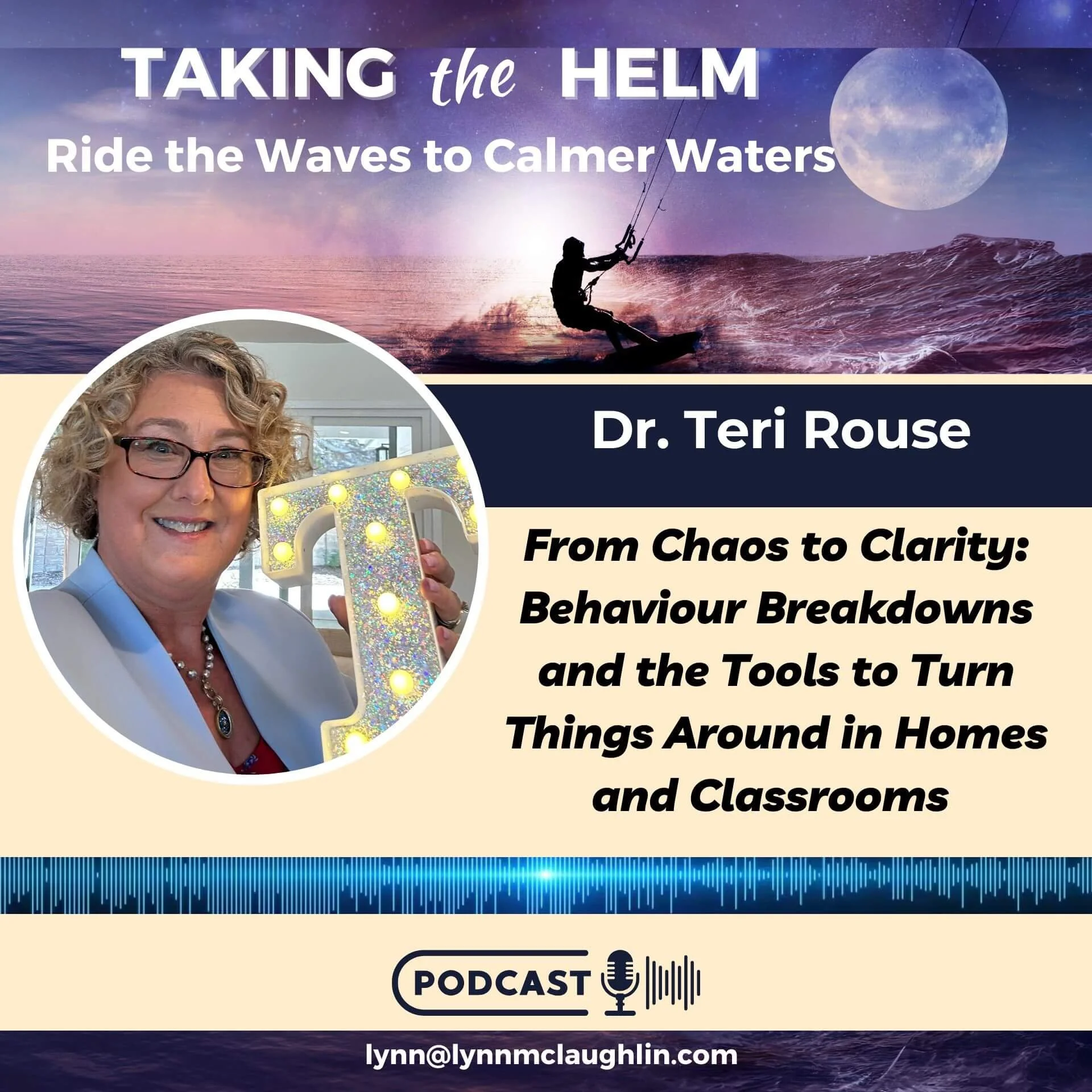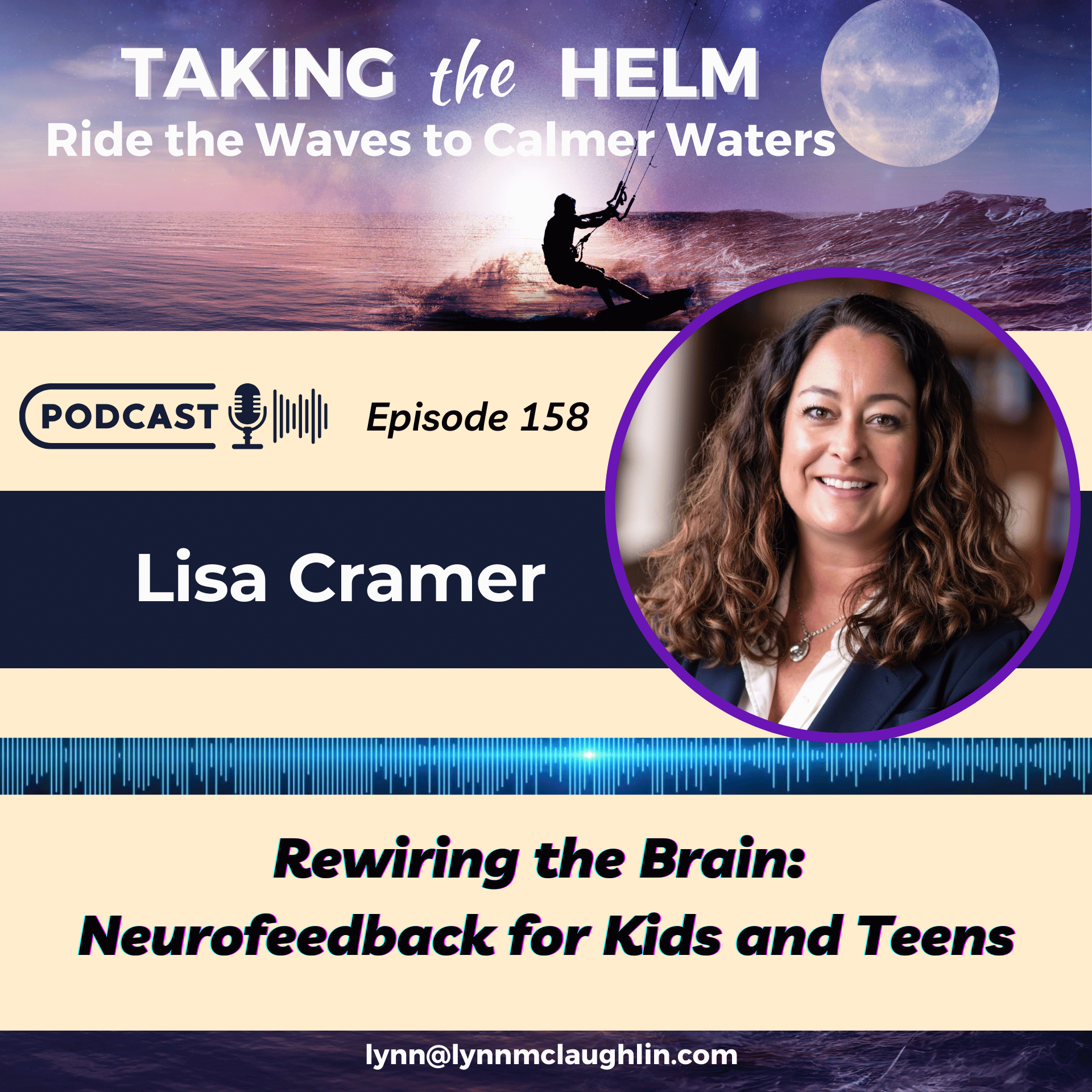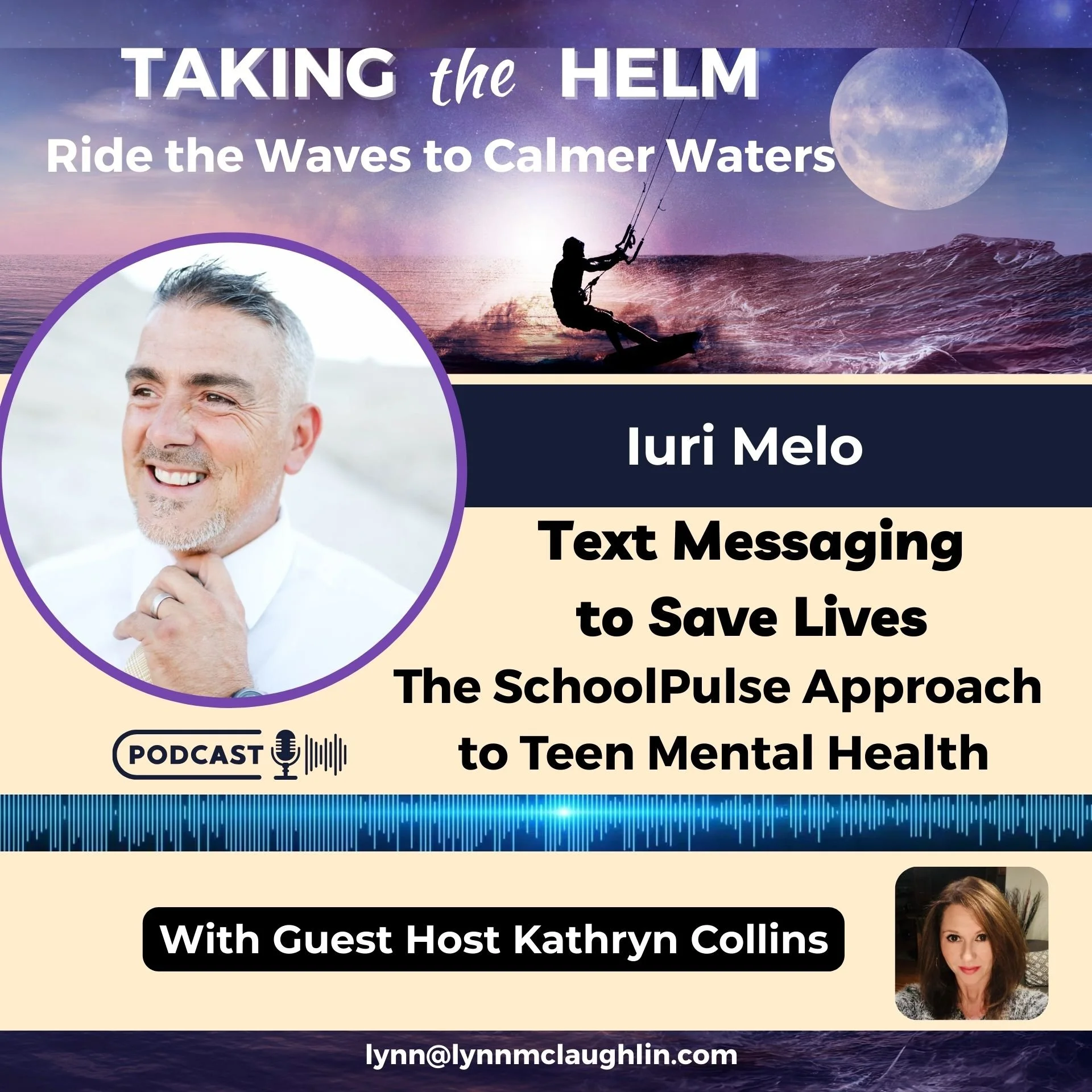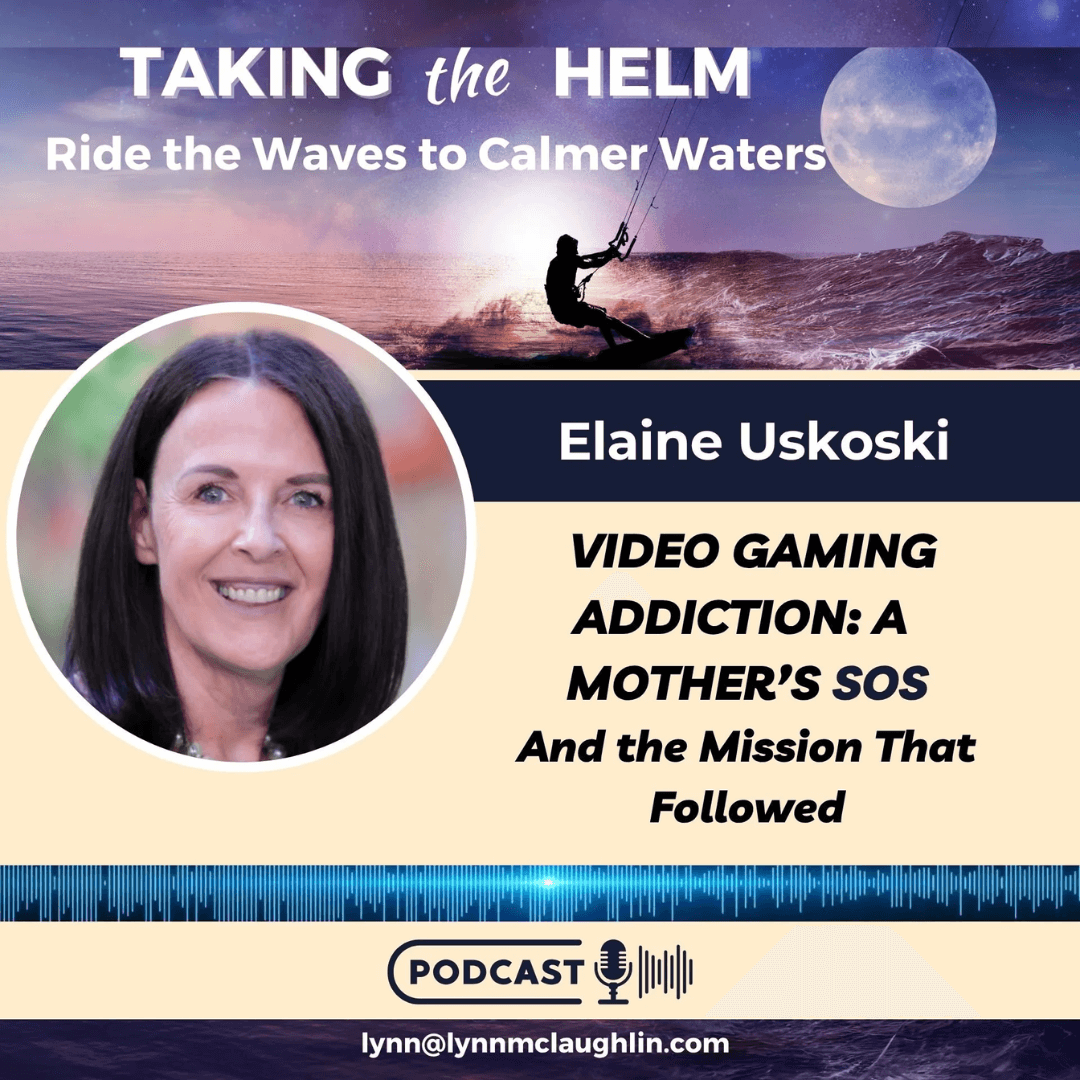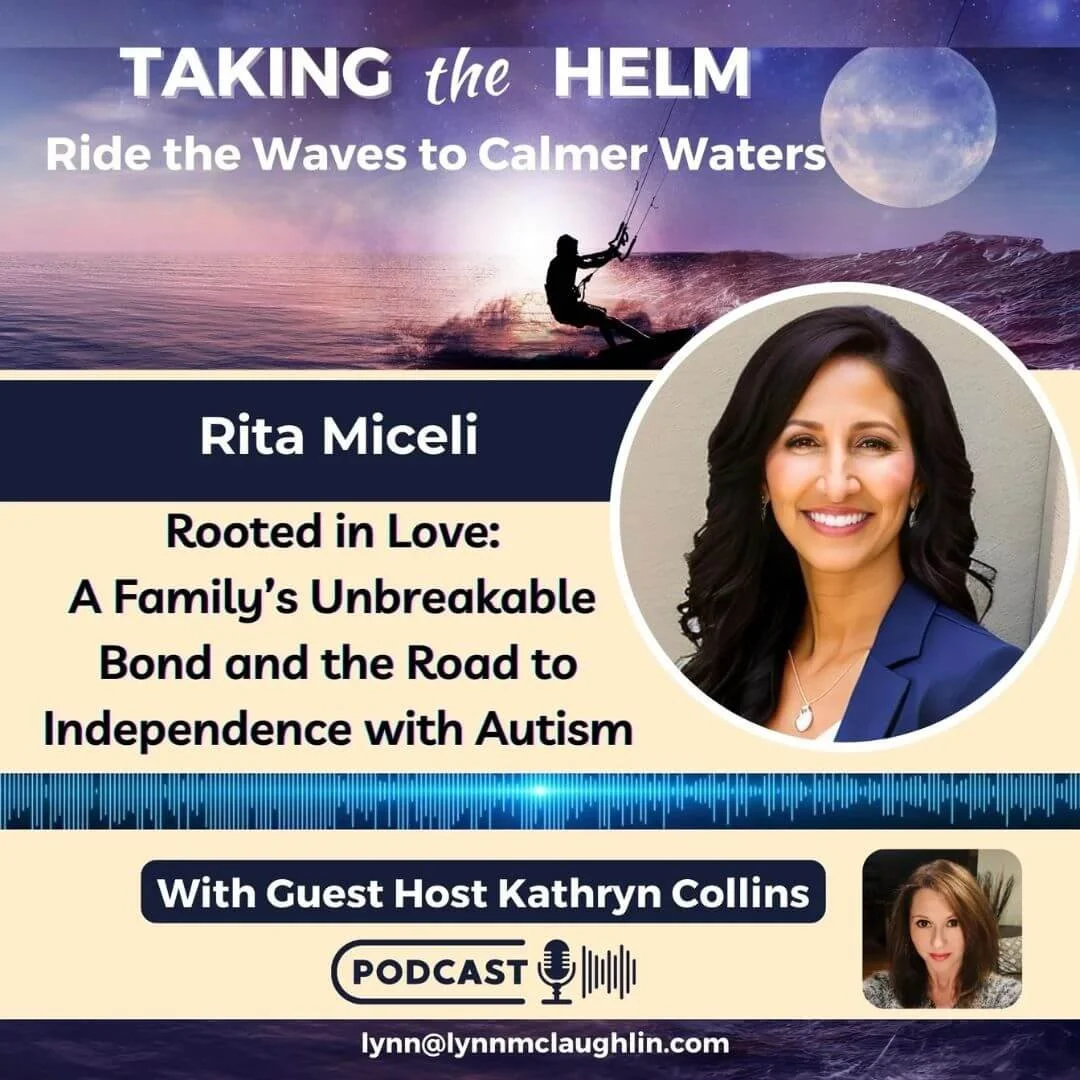
Behaviour Breakdowns and the Tools to Turn Things Around in Homes and Classrooms
Whether you are navigating tantrums or teacher burnout, this week's guest on Taking the Helm, Dr. Teri Rouse offers real-world strategies that are practical, heartfelt, and deeply human. 𝐖𝐡𝐚𝐭 𝐡𝐚𝐩𝐩𝐞𝐧𝐬 𝐰𝐡𝐞𝐧 𝐚 𝐬𝐞𝐚𝐬𝐨𝐧𝐞𝐝 𝐞𝐝𝐮𝐜𝐚𝐭𝐨𝐫 𝐚𝐧𝐝 𝐬𝐩𝐞𝐜𝐢𝐚𝐥 𝐞𝐝𝐮𝐜𝐚𝐭𝐢𝐨𝐧 𝐞𝐱𝐩𝐞𝐫𝐭 𝐟𝐚𝐜𝐞𝐬 𝐛𝐞𝐡𝐚𝐯𝐢𝐨𝐮𝐫𝐬 𝐢𝐧 𝐡𝐞𝐫 𝐨𝐰𝐧 𝐡𝐨𝐦𝐞 𝐭𝐡𝐚𝐭 𝐬𝐡𝐞 𝐜𝐚𝐧’𝐭 𝐞𝐱𝐩𝐥𝐚𝐢𝐧, 𝐥𝐞𝐭 𝐚𝐥𝐨𝐧𝐞 𝐦𝐚𝐧𝐚𝐠𝐞?
Join Dr. Teri, Women Changing the World Award winner, as she shares her journey with her step-son and how it led her to a doctorate in behaviour management. She unpacks the emotional and professional challenges educators and parents face today, with solutions!
💥 Her unique BARC system for tracking behaviour.
💥 The importance of asking "What are you feeling now?", and how to co-create a plan that works for both child and adult. 💥 She opens up about her REAL Peaceful Parenting Framework, the power of communication in identifying root issues, and why early intervention is non-negotiable. 💥 From her Snuggle Bunny Time to her book 𝗨𝗻𝘁𝗮𝗺𝗲𝗱 𝗖𝗵𝗮𝗼𝘀, her tools and strategies are born from both academic expertise and lived experience. 💥 New autism research and practical ways to reconnect with your child—starting with one outdoor moment at a time.
Whether you’re a teacher, parent, or professional working with kids, this episode is a must-listen.
Coming June 11th
Whether you are navigating tantrums or teacher burnout, this week's guest on Taking the Helm, Dr. Teri Rouse offers real-world strategies that are practical, heartfelt, and deeply human. 𝐖𝐡𝐚𝐭 𝐡𝐚𝐩𝐩𝐞𝐧𝐬 𝐰𝐡𝐞𝐧 𝐚 𝐬𝐞𝐚𝐬𝐨𝐧𝐞𝐝 𝐞𝐝𝐮𝐜𝐚𝐭𝐨𝐫 𝐚𝐧𝐝 𝐬𝐩𝐞𝐜𝐢𝐚𝐥 𝐞𝐝𝐮𝐜𝐚𝐭𝐢𝐨𝐧 𝐞𝐱𝐩𝐞𝐫𝐭 𝐟𝐚𝐜𝐞𝐬 𝐛𝐞𝐡𝐚𝐯𝐢𝐨𝐮𝐫𝐬 𝐢𝐧 𝐡𝐞𝐫 𝐨𝐰𝐧 𝐡𝐨𝐦𝐞 𝐭𝐡𝐚𝐭 𝐬𝐡𝐞 𝐜𝐚𝐧’𝐭 𝐞𝐱𝐩𝐥𝐚𝐢𝐧, 𝐥𝐞𝐭 𝐚𝐥𝐨𝐧𝐞 𝐦𝐚𝐧𝐚𝐠𝐞?
Join Dr. Teri, Women Changing the World Award winner, as she shares her journey with her step-son and how it led her to a doctorate in behaviour management. She unpacks the emotional and professional challenges educators and parents face today, with solutions!
💥 Her unique BARC system for tracking behaviour.
💥 The importance of asking "What are you feeling now?", and how to co-create a plan that works for both child and adult.
💥 She opens up about her REAL Peaceful Parenting Framework, the power of communication in identifying root issues, and why early intervention is non-negotiable.
💥 From her Snuggle Bunny Time to her book 𝗨𝗻𝘁𝗮𝗺𝗲𝗱 𝗖𝗵𝗮𝗼𝘀, her tools and strategies are born from both academic expertise and lived experience.
💥 New autism research and practical ways to reconnect with your child—starting with one outdoor moment at a time.
Whether you’re a teacher, parent, or professional working with kids, this episode is a must-listen.
Subscribe from your the platform of your choice
Rooted in Love | a Family’s Unbreakable Bond and the Road to Independence With Autism
When Rita Miceli received her son Giaci’s autism diagnosis, her world shifted - but it didn’t break. In the second part of this heartfelt conversation on Taking the Helm, Rita shares how her family navigated the uncertainty, fear, generational and cultural beliefs by building an unshakable foundation of love, support, and understanding.
Rita also reflects on sibling connection, self-care, the steps they took to build their son's independence and how she found peace knowing her son will always be supported. It’s a conversation filled with honesty, hope, and the powerful reminder that love can truly light the way.
💥 How do parents cope when they hear the diagnosis?
💥 How do we take care of ourselves and find strength rather than working at it from a point of weakness?
💥 Giaci's siblings adore him. What made this possible and how has he has made them better people?
💥 Giaci did not go to traditional high school. What did he do as an alternative that introduced him to the work world?
💥How did one TikTok post go viral and how does Giaci's social media posts give families a light at the end of the tunnel?
💥 How did his family prepare Giaci for his sister's wedding and the dance he had with her?
When Rita Miceli received her son Giaci’s autism diagnosis, her world shifted - but it didn’t break. In the second part of this heartfelt conversation on Taking the Helm, Rita shares how her family navigated the uncertainty, fear, generational and cultural beliefs by building an unshakable foundation of love, support, and understanding.
Rita also reflects on sibling connection, self-care, the steps they took to build their son's independence and how she found peace knowing her son will always be supported. It’s a conversation filled with honesty, hope, and the powerful reminder that love can truly light the way.
💥 How do parents cope when they hear the diagnosis?
💥 How do we take care of ourselves and find strength rather than working at it from a point of weakness?
💥 Giaci's siblings adore him. What made this possible and how has he has made them better people?
💥 Giaci did not go to traditional high school. What did he do as an alternative that introduced him to the work world?
💥How did one TikTok post go viral and how does Giaci's social media posts give families a light at the end of the tunnel?
💥 How did his family prepare Giaci for his sister's wedding and the dance he had with her?
Rita Miceli is the author of "GIACI AND ME: A Mother's Journey of Loving and Raising an Autistic Child", see website www.giaciandme.com. She is an experienced Teacher of about thirty years, with a demonstrated history of working in the education management industry. She is a proven advocate for all persons living with Autism and a guest speaker who avidly promotes bringing awareness and educating others about Autism.
Subscribe from your the platform of your choice
Hope in the Hard: Autism, Advocacy and the Lessons Her Son Taught Her
Rita Miceli is the proud mother of three daughters and her autistic son. A TikTok video of her son became viral and sparked a community with over 600,000 followers. It was the catalyst for a platform, a message, and eventually, her book 𝗚𝗶𝗮𝗰𝗶 𝗮𝗻𝗱 𝗠𝗲: 𝐀 𝐌𝐨𝐭𝐡𝐞𝐫’𝐬 𝐉𝐨𝐮𝐫𝐧𝐞𝐲 𝐨𝐟 𝐋𝐨𝐯𝐢𝐧𝐠 𝐚𝐧𝐝 𝐑𝐚𝐢𝐬𝐢𝐧𝐠 𝐚𝐧 𝐀𝐮𝐭𝐢𝐬𝐭𝐢𝐜 𝐂𝐡𝐢𝐥𝐝.
For her manuscript, "Giaci and Me: Life Lessons on Raising an Autistic Child, " the Word Guild awarded her the Best New Canadian Manuscript award. With over three decades of educational experience, Rita teaches in the Autism and Behavioural Science Graduate Program at St. Clair College in Windsor, Ontario.
💥 What were the first indicators that caused concern?
💥 How did Giaci gain independence, and how effective was Applied Behaviour Analysis (ABA) in Giaci's development?
💥 Rita's journey as a mother of four, navigating the early signs, delayed diagnosis, and emotional toll of parenting a child with autism.
💥 Rita opens up about the grieving process parents often go through, mourning the life they imagined for their child and the one they must now build together.
💥 What is the latest research connecting genetics to autism and the groundbreaking work from Toronto Sick Kids Hospital?
💥 What are some early interventions?
Her family's journey has been highlighted in The Drive Magazine, on CTV News, and CBC National News. Rita is the past president of Autism Ontario (Windsor/Essex Chapter) and has published works on multiple platforms related to special needs and autism, including "A Call to Action" (Autism Matters) and "Words that Connect Us" (Canadian Authors Association). Additionally, Rita's short story "Going to the Dance" has been featured on Spillwords Press.
Rita Miceli is the proud mother of three daughters and her autistic son. A TikTok video of her son became viral and sparked a community with over 600,000 followers. It was the catalyst for a platform, a message, and eventually, her book 𝗚𝗶𝗮𝗰𝗶 𝗮𝗻𝗱 𝗠𝗲: 𝐀 𝐌𝐨𝐭𝐡𝐞𝐫’𝐬 𝐉𝐨𝐮𝐫𝐧𝐞𝐲 𝐨𝐟 𝐋𝐨𝐯𝐢𝐧𝐠 𝐚𝐧𝐝 𝐑𝐚𝐢𝐬𝐢𝐧𝐠 𝐚𝐧 𝐀𝐮𝐭𝐢𝐬𝐭𝐢𝐜 𝐂𝐡𝐢𝐥𝐝.
For her manuscript, "Giaci and Me: Life Lessons on Raising an Autistic Child, " the Word Guild awarded her the Best New Canadian Manuscript award. With over three decades of educational experience, Rita teaches in the Autism and Behavioural Science Graduate Program at St. Clair College in Windsor, Ontario.
💥 What were the first indicators that caused concern?
💥 How did Giaci gain independence, and how effective was Applied Behaviour Analysis (ABA) in Giaci's development?
💥 Rita's journey as a mother of four, navigating the early signs, delayed diagnosis, and emotional toll of parenting a child with autism.
💥 Rita opens up about the grieving process parents often go through, mourning the life they imagined for their child and the one they must now build together.
💥 What is the latest research connecting genetics to autism and the groundbreaking work from Toronto Sick Kids Hospital?
💥 What are some early interventions?
Her family's journey has been highlighted in The Drive Magazine, on CTV News, and CBC National News. Rita is the past president of Autism Ontario (Windsor/Essex Chapter) and has published works on multiple platforms related to special needs and autism, including "A Call to Action" (Autism Matters) and "Words that Connect Us" (Canadian Authors Association). Additionally, Rita's short story "Going to the Dance" has been featured on Spillwords Press.
Subscribe from your the platform of your choice
CELEBRATING Our 150th guest! From Classroom to Home | Unlocking Learning for Every Child with Assistive Technology
Assistive technology is more than just a tool—it’s a game-changer for students of all abilities, helping to bridge gaps in learning and create equitable opportunities.
Erin Plumb is a leader in assistive technology with 20+ years of expertise in accessibility, accommodations, and inclusion. Passionate about accessibility, she advocates for equitable education and empowers educators to adopt best practices in assistive technology, shaping a more inclusive future.
Key Points:
💥 What is assistive technology?
💥 Why is it so important globally in this digital world?
💥 Reading, Writing, Math and STEM programs (Text Help Read and Write, Equatio as examples)
💥 What are the pros and cons of using tech in the classroom? How does it support educators, inclusivity and those with special needs?
💥 What programs or apps can we use to access books and resources that are already formatted?
💥 Tips for parents on how to choose and use the right apps/tools.
💥 AI is here to stay. How do we embrace it safely in schools?
💥 What will assistive tech look like in the future and how should we support educators with universal design for learning?
We are celebrating our 150th guest with Erin Plumb!
Assistive technology is more than just a tool—it’s a game-changer for students of all abilities, helping to bridge gaps in learning and create equitable opportunities.
Erin Plumb is a leader in assistive technology with 20+ years of expertise in accessibility, accommodations, and inclusion. Passionate about accessibility, she advocates for equitable education and empowers educators to adopt best practices in assistive technology, shaping a more inclusive future.
Key Points:
💥 What is assistive technology?
💥 Why is it so important globally in this digital world?
💥 Reading, Writing, Math and STEM programs (Text Help Read and Write, Equatio as examples)
💥 What are the pros and cons of using tech in the classroom? How does it support educators, inclusivity and those with special needs?
💥 What programs or apps can we use to access books and resources that are already formatted?
💥 Tips for parents on how to choose and use the right apps/tools.
💥 AI is here to stay. How do we embrace it safely in schools?
💥 What will assistive tech look like in the future and how should we support educators with universal design for learning?
Erin shares a written synopsis and resource links for many organizations that support Assistive Tech worldwide. Click here.
Subscribe from your the platform of your choice
Beyond Boundaries: How Brain-Computer Interfaces Are Transforming Possibilities for Kids
Dr. Christine Daigle is a child and adolescent clinical neuropsychologist and clinical psychologist whose work includes brain-computer interface, translating brain signals into commands to control technology.
She's been doing children's psychology for 17 years, specializing in developmental disabilities, autism, learning challenges, and mental health.
Key points.
💥 Conditions that affect your brain also affect your life.
💥 What is Brain Computer Interface or BCI?
💥 Noninvasive headsets are being researched for children with neuromotor disorders, most of who are nonverbal. Children who have limited motor capabilities learn to use something in their environment.
💥 Imagine a child at home or in school making a character in a video game jump with their thoughts! With a few sessions of 20 minutes of training, students can turn their lights on and off, turn the pages of a virtual book, start and stop a motorized wheelchair, and more.
💥 Research is now being done in classroom environments with tremendous potential for independence, play, socialization, and inclusion.
💥 Anything that can be done with a switch adaptor can be done with a BCI. Communication is beginning to be researched with great potential using headsets.
💥 A current research study is underway. Can the headsets work in classrooms with noise, distraction, and movement? They are working in the current trials.
💥 What are the challenges?
Dr. Christine Daigle is a child and adolescent clinical neuropsychologist and clinical psychologist whose work includes brain-computer interface, translating brain signals into commands to control technology.
She's been doing children's psychology for 17 years, specializing in developmental disabilities, autism, learning challenges, and mental health.
Key points.
💥 Conditions that affect your brain also affect your life.
💥 What is Brain Computer Interface or BCI?
💥 Noninvasive headsets are being researched for children with neuromotor disorders, most of who are nonverbal. Children who have limited motor capabilities learn to use something in their environment.
💥 Imagine a child at home or in school making a character in a video game jump with their thoughts! With a few sessions of 20 minutes of training, students can turn their lights on and off, turn the pages of a virtual book, start and stop a motorized wheelchair, and more.
💥 Research is now being done in classroom environments with tremendous potential for independence, play, socialization, and inclusion.
💥 Anything that can be done with a switch adaptor can be done with a BCI. Communication is beginning to be researched with great potential using headsets.
💥 A current research study is underway. Can the headsets work in classrooms with noise, distraction, and movement? They are working in the current trials.
💥 What are the challenges?
Subscribe from your the platform of your choice

